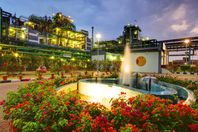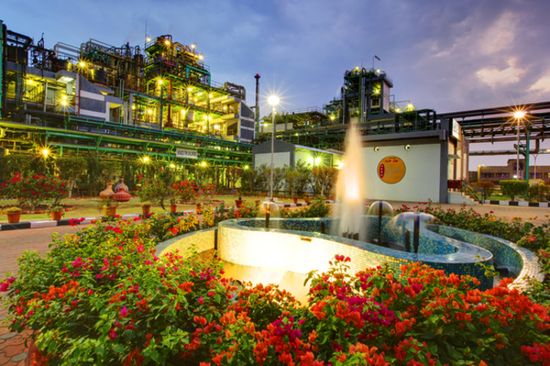
Asia
EMEA

Sustainability
- Co-generation plant
Nagda site has a co-generation plant which is fuelled by biomass. By utilizing a renewable source of energy (soya or mustard husk), LANXESS has significantly reduced its carbon footprint by 70,000 metric tons of coal per year and thus reduced annual CO2 emissions by about 120,000 tons. The combustion of biomass as a fuel is carbon neutral for the environment. This co-generation plant, being the largest consumer of Biomass in the region, benefits farmers financially. Besides, the Nagda site also owns seven wind turbines in Madhya Pradesh and Maharashtra which generate approximately 700 MWh of electricity every year. This energy is returned to the grid. Notably, the site is registered for availing the benefit of Renewable Energy Certificates (REC) by the government of Madhya Pradesh from May 2013.
- Waste water treatment at Nagda site
The LANXESS site at Nagda has a full-fledged sewage treatment plant and waste water treatment plant.
Sewage treatment plant - This full-fledged sewage treatment plant is the first-of-its-kind in Madhya Pradesh, which treats and recycles domestic sewage water from the site as well as the nearby colonies. This initiative was also awarded by Indian Chemical Council in 2009 for its innovative approach to recycle and harness domestic sewage water for industrial use. The site utilizes treated sewage water for make-up water of cooling towers and has a reverse osmosis plant to further process the sewage water for use as boiler feed water. The site also efficiently recycles steam condensate.
Waste water post treatment plant - Taking another step towards sustainability, the waste water post treatment plant was commissioned at the site. This plant treats the discharge from the existing Effluent Treatment Plant (ETP) in a manner that virtually no liquid effluent is discharged from the site. The water recovered from the waste water post treatment plant can be used for the production processes. This initiative not only prevents contamination of the river Chambal, which is primary source of water for the villagers downstream but also significantly reduces dependence on conventional water sources. It is indeed a remarkable step towards sustainability and sets a standard for the Indian chemical industry.
- Offgas Incinerator
The twin-chamber incinerator has been constructed using the most modern technology and is commissioned for safe disposal of distillation residue generated from plant production processes. Steam is generated using the heat recovered from flue gas, which is in turn used for production processes. It has been designed with dual scrubbing systems for recovering HCl from flue gas. It complies with all requirements laid down by Central Pollution Control Board and the Madhya Pradesh Control Board.
- Comprehensive air pollution control equipment is installed and responsible disposal of waste is undertaken at this site.
- Other health and safety initiatives
♦ A full-fledged occupational and health centre equipped with all necessary medical facilities and manned 24*7 by experienced medical officers, capable of mitigating emergencies
♦ Pollution control devices and leak detectors installed for early detection and to prevent adverse effects on employees‘ health
♦ Closed plants and processes reducing possibility of exposure
- Gallery



